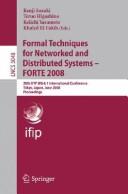| Listing 1 - 2 of 2 |
Sort by
|
Book
ISBN: 9780470753675 0470753676 Year: 2008 Publisher: Chichester Wiley
Abstract | Keywords | Export | Availability | Bookmark
 Loading...
Loading...Choose an application
- Reference Manager
- EndNote
- RefWorks (Direct export to RefWorks)
**"Triple Play"**is a combination of Internet access, voice communication (telephony), and entertainment services such as IP television and video on demand. The erosion of the traditional voice service, together with the ever-increasing competition between companies, is pushing the telecommunications industry towards a major shift in its business models. Customers want more services in a more flexible way. Today, this shift can only be carried out by offering converged services built around the Internet Protocol (IP). Triple Play, a bundle of voice, video, and data services for residential customers, is the basis of this new strategy. Hens and Caballero explain how and why the telecommunications industry is facing this change, how to define, implement and offer these new services, and describes the technology behind the converged network. *Triple Play* analyses a number of business strategies to minimise costs, while migrating infrastructures and offering new services. Triple Play: - Describes the elementary concepts of triple play service provision and gives detailed technical information to highlight key aspects. - Discussed access networks, transport, signaling, service definition and business models. - Covers the latest innovations in Triple Play services such as Ethernet in the First Mile (EFM), VDSL2 (Very High Speed DSL second generation), pseudowires andMultiprotocol Label Switching (MPLS). - Explores video solutions (encoding, IPTV, VoD) alongside transmission and switching technologies (Ethernet, DSL, PON, NG-SDH). - Includes a chapter on IP Multimedia Subsystem (IMS) and on fixed/mobile convergence.
TV (televisie) --- VoIP protocol (Voice over IP) --- IP (internet protocol) --- Computer architecture. Operating systems --- television [telecommunication system] --- Computer networks --- Convergence (Telecommunication) --- Internet telephony --- Internet television --- Computer network protocols --- Internet industry --- Réseaux d'ordinateurs --- Convergence (Télécommunications) --- Téléphonie Internet --- Télévision sur Internet --- Protocoles de réseaux d'ordinateurs --- Internet --- Standards --- Normes --- Industrie --- Réseaux d'ordinateurs --- Convergence (Télécommunications) --- Téléphonie Internet --- Télévision sur Internet --- Protocoles de réseaux d'ordinateurs --- mobiele netwerken --- multimedia

ISBN: 9783540688549 3540688544 3540688552 Year: 2008 Publisher: Berlin ; New York : Springer,
Abstract | Keywords | Export | Availability | Bookmark
 Loading...
Loading...Choose an application
- Reference Manager
- EndNote
- RefWorks (Direct export to RefWorks)
This book constitutes the refereed proceedings of the 28th IFIP WG 6.1 International Conference on Formal Techniques for Networked and Distributed Systems, FORTE 2008, held in Tokyo, Japan, in June 2008 co-located with TestCom/FATES 2008. The 19 revised full papers and 1 revised short paper presented together with 1 invited talk were carefully reviewed and selected from 44 submissions. The papers cover new approaches, concepts and experience in the application of formal methods for the specification and verification of distributed systems and applications. Special focus is put on ubiquitous, grid, and mobile computing systems, and also on the application of formal techniques to service oriented architectures as well as security issues in networked systems. The papers are organized in topical sections on abstraction, verification, specification framework, application, theory, and reliability of networked systems.
Formal methods (Computer science) --- Electronic data processing --- Computer network protocols --- Méthodes formelles (Informatique) --- Traitement réparti --- Protocoles de réseaux d'ordinateurs --- Congresses. --- Distributed processing --- Congrès --- Computer Science --- Telecommunications --- Engineering & Applied Sciences --- Electrical & Computer Engineering --- Information Technology --- Computer Science (Hardware & Networks) --- Computer science. --- Computer communication systems. --- Software engineering. --- Operating systems (Computers). --- Computer logic. --- Computer Science. --- Computer Communication Networks. --- Software Engineering/Programming and Operating Systems. --- Operating Systems. --- Software Engineering. --- Logics and Meanings of Programs. --- Computer science logic --- Logic, Symbolic and mathematical --- Computer operating systems --- Computers --- Disk operating systems --- Systems software --- Computer software engineering --- Engineering --- Communication systems, Computer --- Computer communication systems --- Data networks, Computer --- ECNs (Electronic communication networks) --- Electronic communication networks --- Networks, Computer --- Teleprocessing networks --- Data transmission systems --- Digital communications --- Electronic systems --- Information networks --- Telecommunication --- Cyberinfrastructure --- Network computers --- Informatics --- Science --- Operating systems --- Logic design. --- Design, Logic --- Design of logic systems --- Digital electronics --- Electronic circuit design --- Logic circuits --- Machine theory --- Switching theory
| Listing 1 - 2 of 2 |
Sort by
|

 Search
Search Feedback
Feedback About UniCat
About UniCat  Help
Help News
News